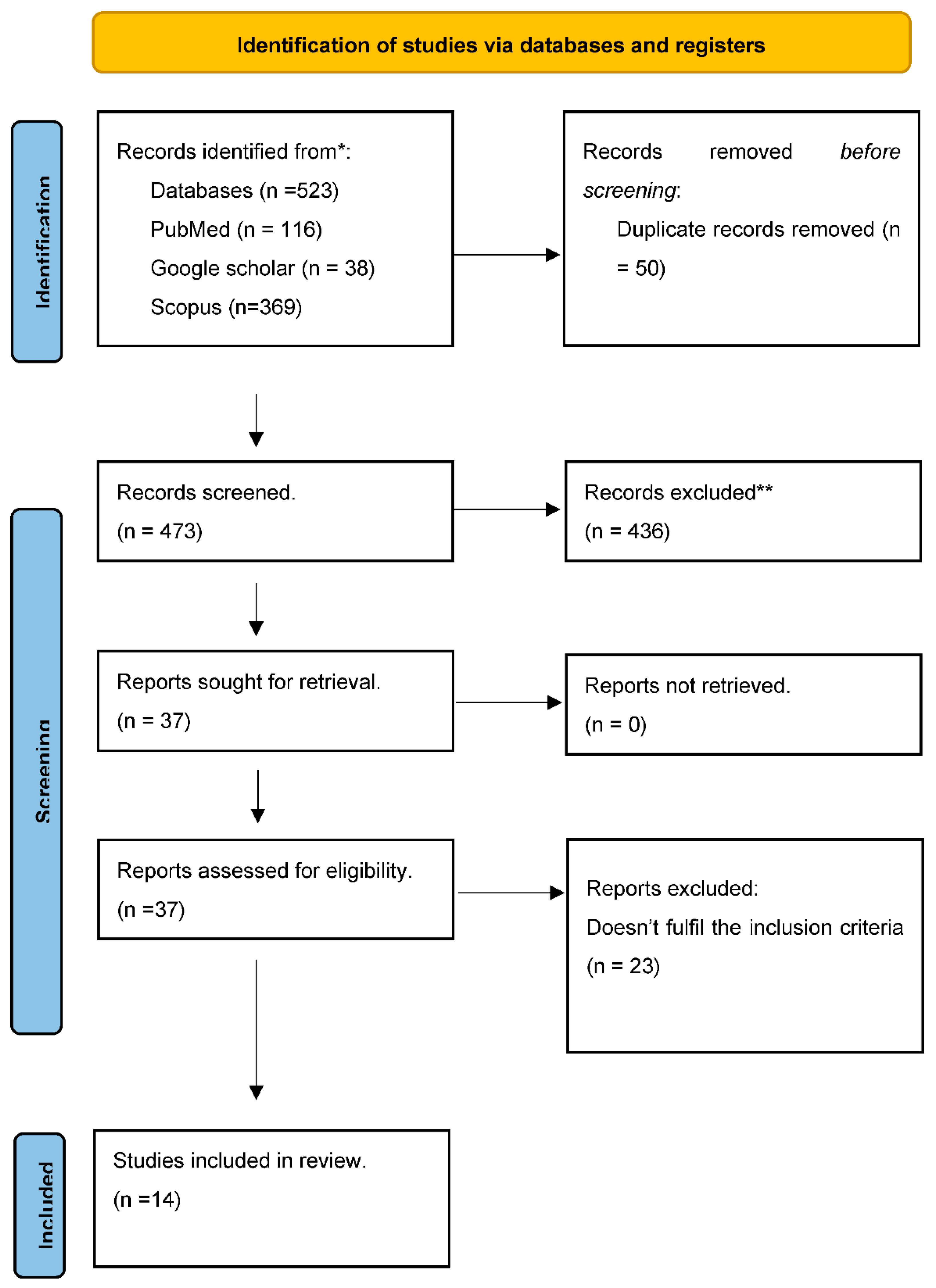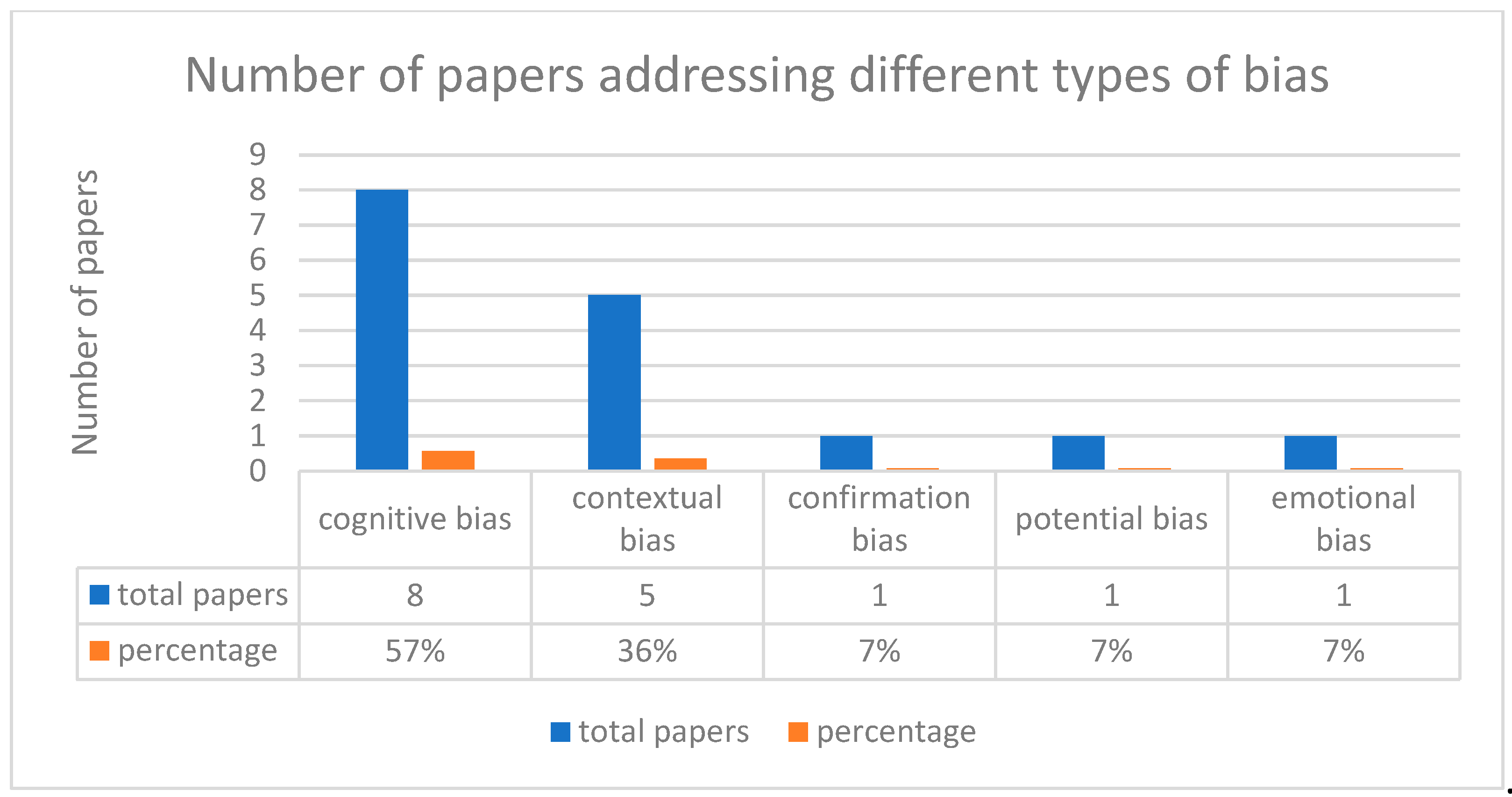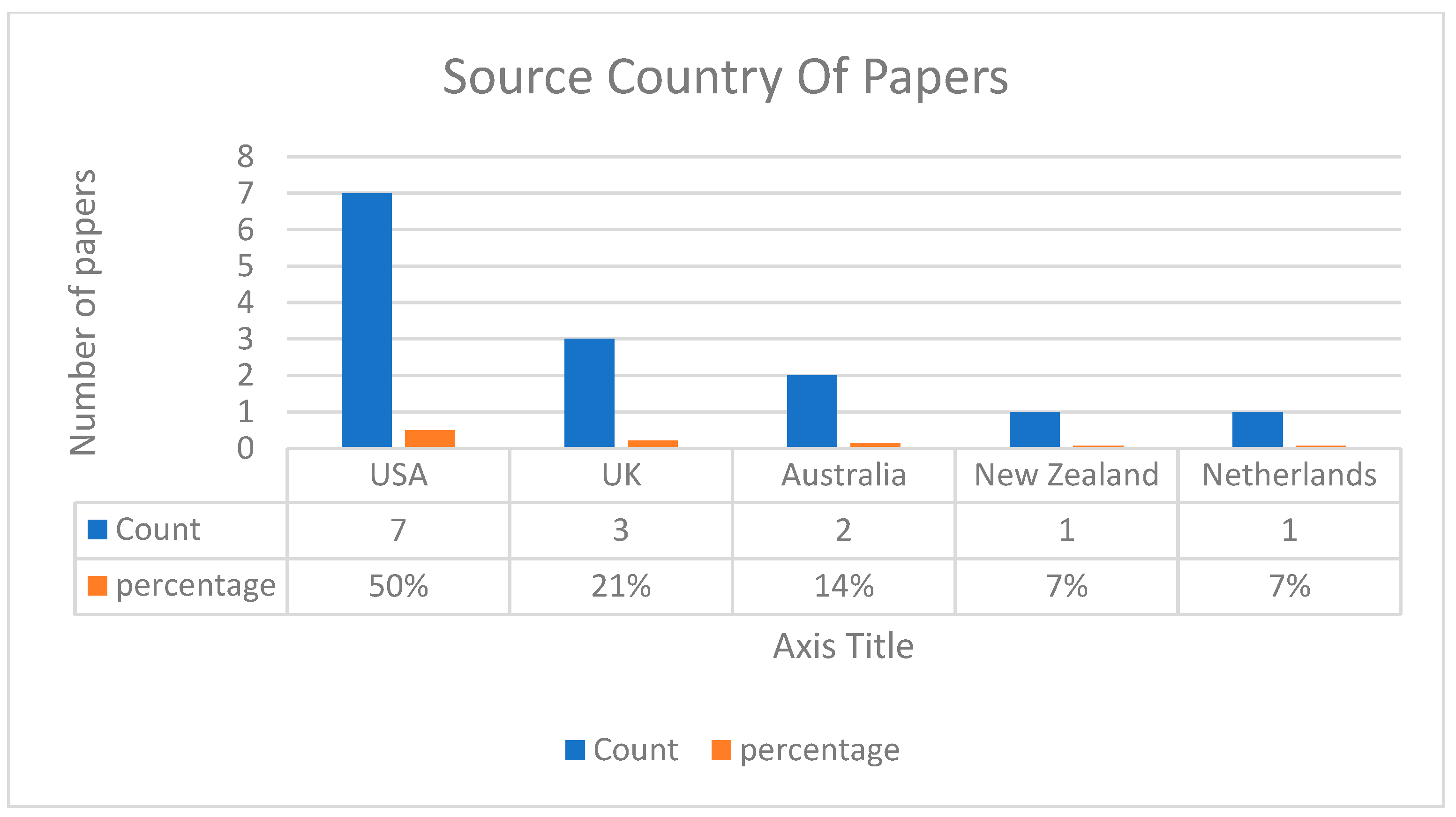Submitted:
29 November 2023
Posted:
05 December 2023
You are already at the latest version
Abstract
Keywords:
1. Introduction
2. Materials and Methods
3. Results

| No# | Title | Author | Source | Origin | year | Type of study (RA=Review article, ES=Experimental study, SR=Systematic review, S=Survey) | Types of bias (CB = cognitive bias; Cont. bias= Contextual bias, NO = no information, PB=Potential Bias, Conf.Bias=Confirmation bias EB=Emotional bias) | Suggestions to reduce bias | Good practice for bite mark analysis |
| 1 | Review of a forensic pseudoscience: Identification of criminals from bitemark patterns | C. Michael Bowers | Scopus | USA | 2019 | RA | CB | No information | No information |
| 2 | Inconsistency in opinions of forensic odontologists when considering bite mark evidence | Gowri Vijay Reesu Nathan Lee Brown |
Scopus | UK | 2016 | S | NO | No information | Introduction of recognized system for validation or revalidation of bitemarks |
| 3 | Expert Disagreement in Bitemark Casework | C. Michael Bowers, Iain A. Pretty |
Scopus | USA | 2009 | ES | NO | No information | Caution must be exercised while examining the bite mark. |
| 4 | Inquiry into the Scientific Basis for Bitemark Profiling and Arbitrary Distortion Compensation | Mary A. Bush et al | Scopus | USA | 2010 | ES | PB | No information | DNA evidence, consider crime scene context, timing of injury, perpetrator identification will make bitemark evidence important in court. |
| 5 | Context Effects and Observer Bias—Implications for Forensic Odontology | Mark Page et al | Scopus | Australia | 2012 | RA | Conf.bias, CB, Cont. bias | The odontologist who was involved in collecting the evidence should not be involved in analysis. Limit the amount of extraneous information to forensic odontologist. Avoid the analysis of poor-quality evidence | take measures to reduce potential biasing effects until there is a better understanding of the probable future path it will take. Experimental data are provided to specify the conditions and quantify the degree to which they affect the analysis and interpretation of bitemark evidence. |
| 6 | The barriers to achieving an evidence base for bitemark analysis | Iain A. Pretty | PubMed | UK | 2006 | ES | NO | No information | Postgraduate programs in forensic training and research. Replication of unique features on human skin and a better understanding of force used in bitemark are essential, odontologist undergo proficiency test and aim to collect biological evidence whenever it is possible |
| 7 | Does contextual information bias bitemark comparisons? | Nikola K.P. Osborne et al | PubMed | New Zealand | 2014 | ES | Cont. bias, EB | No information | Address the questions raised by this research to gain further insight into the mechanism that underlie the interpretation of bitemark evidence |
| 8 | How Cross-Examination on Subjectivity and Bias Affects Jurors’ Evaluations of Forensic Science Evidence | William C. Thompson et al | PubMed | USA | 2019 | S | Cont. bias, CB | Forensic scientists can reduce the contextual bias by adopting context management procedures that shield them from exposure to contextual information that is irrelevant in judgement, jurors also appreciate the blinding procedures | Further research should examine jurors view regarding other forms of contextual bias, using procedure like linear sequential unmasking to reduce level of contextual bias, future research might also use richer stimulus material such as presenting jurors with video of testimony rather than transcript |
| 9 | A practical tool for information management in forensic decisions: Using Linear Sequential Unmasking-Expanded (LSU-E) in casework | Adele Quigley-McBride | Google scholar | USA | 2022 | RA | CB, Cont. bias | Using (LSU-E) technique helps to reduce the cognitive bias while analyzing any evidence | This research helps in the practical implementation of (LSU-E) technique. More research among researchers to turn their research-based solutions into implementable tools for forensic analyst. |
| 10 | Cognitive bias research in forensic science | Glinda S. Cooper | Google scholar | USA | 2019 | ES | CB | No information | Future research provides additional data in understudied disciplines, assess the level of subjectivity in the analytical procedures in relation to presence of bias and assess sample complexity as an effective modifier, attention to guidelines for designing and reporting studies may result in strong and comprehensively described studies |
| 11 | Thinking forensics: Cognitive science for forensic practitioners | Gary Edmond | Google scholar | Australia | 2017 | SR | CB, Cont. bias | No information | To better understand their processes, capabilities, and limitations, forensic practitioners should read about cognitive science and experimental psychology. They might be able to improve output and come up with new, more efficient ways of producing goods, presenting evidence in a way that accurately reflects and communicates what is understood. These reactions would appear to be in line with the kind of expectations that a contemporary society has of both state-employed forensic practitioners and independent forensic science suppliers. |
| 12 | Legal psychologists as experts: guidelines for minimizing bias | Annelies Vredeveldt et al | Google scholar | Netherlands | 2022 | RA | PB, CB | Reducing bias by raising awareness enables implementation of bias reducing measures, awareness on its own is not effective. People frequently suffer from the "illusion of control," thinking that willpower alone can overcome their biases and mental patterns. However, to effectively reduce bias, practical measures must be put in place. | This seems especially important in situations where experts draw vastly diverse conclusions from the same data An examination of these issues would be extremely valuable from both a legal and scientific standpoint. |
| 13 | Human factors in forensic science: The cognitive mechanisms that underlie forensic feature-comparison expertise | Bethany Growns et al | Google scholar | USA | 2020 | RA | NO | No information | Should further investigate the human factors and cognitive mechanisms that play a role in forensic decision making to improve comparison performance and criminal justice outcomes |
| 14 | Cognitive neuroscience in forensic science: understanding and utilizing the human element | Itiel E. Dror | Google scholar | UK | 2015 | RA | CB | No information | These developments will improve forensic science, but they will necessitate some rethinking and reevaluation of existing procedures and ideas, just like any shift. Since cognitive neuroscience offers numerous insights into the human factor, it can greatly influence changes in and advancements in forensic science. |


4. Discussion
5. Conclusions
Acknowledgement
Availability of data and materials
References
- Senn DR, Stimson PG. Forensic dentistry. 2nd ed. Boca Raton, Fla: CRC; 2010.
- Adams C, Carabott R, Evans S. Forensic odontology: an essential guide: John Wiley & Sons; 2014.
- Rai B, Kaur J. Evidence-Based Forensic Dentistry. 1. Aufl. ed. Berlin, Heidelberg: Springer-Verlag; 2013.
- ABFO-Standards-Guidelines-for-Evaluating-Bitemarks-Feb-2018.pdf. 2018:28.
- Bowers CM, Bowers CMC. Forensic Dental Evidence: An Investigator's Handbook. San Diego: Elsevier Science; 2010.
- Zajac R, Osborne N, Kieser J. Contextual Bias in the Analysis of Bitemarks. 2015:1-9.
- Dror, I. The ambition to be scientific: Human expert performance and objectivity. Science & Justice 2013, 53, 81–82. [Google Scholar]
- Simoncelli T. pcast_forensic_science_report_final.pdf. 2016.
- Mânica GMS. Forensic Odontology: Psychological Aspects Reflected in the Dental.
- Mirror. 2020.
- Saks, M.J.; Albright, T.; Bohan, T.L.; Bierer, B.E.; Bowers, C.M.; Bush, M.A.; et al. Forensic bitemark identification: weak foundations, exaggerated claims. J Law Biosci. 2016, 3, 538–575. [Google Scholar] [CrossRef] [PubMed]
- Bowers, CM. Review of a forensic pseudoscience: Identification of criminals from bitemark patterns. Journal of Forensic and Legal Medicine 2019, 61, 34–39. [Google Scholar] [CrossRef] [PubMed]
- Dror, I.E. Cognitive neuroscience in forensic science: understanding and utilizing the human element. Philos Trans R Soc Lond B Biol Sci. 2015, 370. [Google Scholar] [CrossRef]
- Reesu, G.V.; Brown, N.L. Inconsistency in opinions of forensic odontologists when considering bite mark evidence. Forensic Science International. 2016, 266, 263–270. [Google Scholar] [CrossRef]
- Bush, M.A.; Cooper, H.I.; Dorion, R.B.J. Inquiry into the scientific basis for bitemark profiling and arbitrary distortion compensation. Journal of Forensic Sciences 2010, 55, 976–983. [Google Scholar] [CrossRef]
- brownroy1.pdf.
- Bush, M.A.; Miller, R.G.; Bush, P.J. C.E. Credit. Bitemark Analysis: The Legal vs Scientific Battle for Justice. Journal of the California Dental Association 2023, 51, 2191391. [Google Scholar] [CrossRef]
- the CoItNo, Forensic Sciences Community N, Council R. NAS report 2009.pdf. 2009.
- Quigley-McBride, A.; Dror, I.E.; Roy, T.; Garrett, B.L.; Kukucka, J. A practical tool for information management in forensic decisions: Using Linear Sequential Unmasking-Expanded (LSU-E) in casework. Forensic Sci Int Synerg. 2022, 4, 100216. [Google Scholar] [CrossRef]
- Dror, I.E.; Kukucka, J. Linear Sequential Unmasking–Expanded (LSU-E): A general approach for improving decision making as well as minimizing noise and bias. Forensic Science International: Synergy 2021, 3, 100161. [Google Scholar] [CrossRef]
- Page, M.; Taylor, J.; Blenkin, M. Context effects and observer bias--implications for forensic odontology. J Forensic Sci. 2012, 57, 108–112. [Google Scholar] [CrossRef]
- Holden, J.D. Hawthorne effects and research into professional practice. J Eval Clin Pract. 2001, 7, 65–70. [Google Scholar] [CrossRef] [PubMed]
- Wickström, G.; Bendix, T. The "Hawthorne effect"--what did the original Hawthorne studies actually show? Scand J Work Environ Health 2000, 26, 363–367. [Google Scholar] [CrossRef] [PubMed]
- Saks, M.J.; Risinger, D.M.; Rosenthal, R.; Thompson, W.C. Context effects in forensic science: a review and application of the science of science to crime laboratory practice in the United States. Sci Justice 2003, 43, 77–90. [Google Scholar] [CrossRef] [PubMed]
- Dror, I.E. Cognitive and Human Factors in Expert Decision Making: Six Fallacies and the Eight Sources of Bias. Analytical Chemistry 2020, 92, 7998–8004. [Google Scholar] [CrossRef] [PubMed]
- Osborne, N.K.; Woods, S.; Kieser, J.; Zajac, R. Does contextual information bias bitemark comparisons? Sci Justice 2014, 54, 267–273. [Google Scholar] [CrossRef] [PubMed]
- Sweet, D.; Pretty, I.A. A look at forensic dentistry - Part 2: Teeth as weapons of violence-identification of bitemark perpetrators. British Dental Journal 2001, 190, 415–418. [Google Scholar] [CrossRef] [PubMed]
- Page, M.; Taylor, J.; Blenkin, M. Reality bites—A ten-year retrospective analysis of bitemark casework in Australia. Forensic science international 2012, 216, 82–87. [Google Scholar] [CrossRef] [PubMed]
- Council NR. Strengthening forensic science in the United States: a path forward: National Academies Press; 2009.
- Sheasby, D.R.; MacDonald, D.G. A forensic classification of distortion in human bite marks. Forensic Science International 2001, 122, 75–78. [Google Scholar] [CrossRef] [PubMed]
- Thompson, W.C.; Scurich, N. How Cross-Examination on Subjectivity and Bias Affects Jurors' Evaluations of Forensic Science Evidence. J Forensic Sci. 2019, 64, 1379–1388. [Google Scholar] [CrossRef]
- Thompson, W.C. What role should investigative facts play in the evaluation of scientific evidence? Australian Journal of Forensic Sciences 2011, 43, 123–134. [Google Scholar] [CrossRef]
- Found, B.; Ganas, J. The management of domain irrelevant context information in forensic handwriting examination casework. Sci Justice 2013, 53, 154–158. [Google Scholar] [CrossRef] [PubMed]
- Osborne, N.K.P.; Taylor, M.C. Contextual information management: An example of independent-checking in the review of laboratory-based bloodstain pattern analysis. Sci Justice 2018, 58, 226–231. [Google Scholar] [CrossRef] [PubMed]
- Cunliffe, E.; Edmond, G. Gaitkeeping in Canada: Mis-Steps in assessing the reliability of expert testimony. Can B Rev. 2013, 92, 327. [Google Scholar]
- Klein, G. Naturalistic decision making. Human Factors 2008, 50, 456–460. [Google Scholar] [CrossRef] [PubMed]
- Petty RE, Cacioppo JT, Petty RE, Cacioppo JT. The elaboration likelihood model of persuasion: Springer; 1986.
- Nickerson, R.S. Confirmation bias: A ubiquitous phenomenon in many guises. Review of General Psychology 1998, 2, 175–220. [Google Scholar] [CrossRef]
- Edmond, G.; Towler, A.; Growns, B.; Ribeiro, G.; Found, B.; White, D.; et al. Thinking forensics: Cognitive science for forensic practitioners. Sci Justice 2017, 57, 144–154. [Google Scholar] [CrossRef] [PubMed]
- Dror, I.E.; Wertheim, K.; Fraser-Mackenzie, P.; Walajtys, J. The impact of human-technology cooperation and distributed cognition in forensic science: biasing effects of AFIS contextual information on human experts. J Forensic Sci. 2012, 57, 343–352. [Google Scholar] [CrossRef] [PubMed]
- Herzog, M.H.; Fahle, M. The role of feedback in learning a vernier discrimination task. Vision Research 1997, 37, 2133–2141. [Google Scholar] [CrossRef] [PubMed]
- Freeman, A.J.; Senn, D.R.; Arendt, D.M. Seven hundred seventy eight bite marks: analysis by anatomic location, victim and biter demographics, type of crime, and legal disposition. J. Forensic Sci. 2005, 50, 1–8. [Google Scholar] [CrossRef]
- Kassin, S.M.; Dror, I.E.; Kukucka, J. The forensic confirmation bias: problems, perspectives, and proposed solutions. Journal of Applied Research in Memory, and Cognition 2013, 2, 42–52. [Google Scholar] [CrossRef]
- Page, M.; Taylor, J.; Blenkin, M. Context effects and observer bias – implications for forensic odontology. Journal of Forensic Sciences 2012, 57, 108–112, https://innocenceproject.org/about/. [Google Scholar] [CrossRef] [PubMed]
- Project, I., 2022. Roy Brown Exonerated - Innocence Project. [online] Available at: <https://innocenceproject.org/roy-brown-exonerated.
| Database | Search Strategy (combination of key words) |
| PubMed https://pubmed.ncbi.nlm.nih.gov/ |
(humans [MeSH] OR humans [Title/Abstract]) AND (Bites, Human [MeSH] OR bitemark OR "bite mark*") AND (Observer Variation [MeSH] OR bias OR accuracy OR accurate OR variation OR error* OR mistake*) |
| Scopus https://www.scopus.com/ |
(TITLE-ABS-KEY (human*) AND TITLE-ABS-KEY (bitemark* OR "bite mark*") AND TITLE-ABS-KEY (bias, variation, OR accuracy OR accurate OR variation OR error* OR mistake* OR analysis)) |
| Google scholar https://scholar.google.com/ |
(bitemark OR " human bite mark") AND (cognitive bias OR contextual bias OR accuracy OR accurate OR mistake) |
Disclaimer/Publisher’s Note: The statements, opinions and data contained in all publications are solely those of the individual author(s) and contributor(s) and not of MDPI and/or the editor(s). MDPI and/or the editor(s) disclaim responsibility for any injury to people or property resulting from any ideas, methods, instructions or products referred to in the content. |
© 2023 by the authors. Licensee MDPI, Basel, Switzerland. This article is an open access article distributed under the terms and conditions of the Creative Commons Attribution (CC BY) license (http://creativecommons.org/licenses/by/4.0/).





